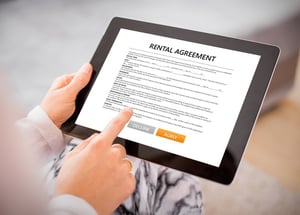
Have you ever heard of a lease with a price sheet for repairs? If you haven’t, you’re not alone. In fact, many property owners make the mistake of keeping their leases too rudimentary, covering just the basics: when rent is due, whether or not pets are allowed, who pays for utilities, and who’s responsible for landscaping.
At Haven Homes, we believe that a well-written lease serves as a handbook that both residents and owners can revisit again and again to clarify expectations. An effective lease should clearly inform residents of their responsibilities and, most importantly, protects the owner’s real estate investment.
Why is this so crucial? A poorly-written lease has many gray areas, leaving room for confusion, and ultimately, disputes. Remember, if it’s not in the lease, it’s not enforceable.
With that in mind, how can property owners write a detailed and watertight lease that will maximize their profits and lower their stress levels? Here are some tips:
Set clear expectations.
Be specific about resident versus owner responsibilities. At Haven Homes, our leases include a section that details exactly what residents are responsible for, down to non-functioning toilet flappers. While it might seem excessive, it is in fact, good property management. Again, the goal is to establish clear expectations for both parties.
Wear and tear.
You don’t want to put an undue burden on the resident to fix items in the home, yet you want them to maintain your real estate investment and return the property to you in the same condition as it was provided at move in. More often than not, resident-specific maintenance is fairly inexpensive. In our toilet flapper example, a resident can purchase a new kit for roughly $15 and install it in less than 15 minutes.
Keep residents informed.
If residents are required to handle certain responsibilities according to the lease agreement, follow up and be proactive. If they haven’t resolved the problem, let them know that you will—but there will be a cost. That’s why we use a price sheet that lets the resident know exactly how much it will cost to have one of our vendors come out and correct the problem. Often, that’s enough of a push to encourage the residents to do it themselves, but if not, there are no surprises and they’ll expect the bill.
Specify resident HOA responsibilities.
HOA rules and responsibilities vary among communities and should be outlined in the lease document. While we inform residents about HOA rules and regulations, occasionally even the best residents slip up. For example, maybe they have an absent-minded moment and leave their trash cans out on the side of the street on non-trash days. So what happens? Typically, you get a warning or correction notice that you pass on to the resident. If they don’t fix or correct the infringement, then a fine is issued to the owner. A thorough lease agreement spells out that the cost of any violation caused by residents will be passed along and become their responsibility.
Protect yourself from lease breaks.
You’d be surprised how many property owners don’t specify what happens if the resident breaks the lease or doesn’t fulfill their lease term. You must include a clause that designates the resident’s financial obligation for breaking the lease agreement. Otherwise, you’ll find yourself without a resident or a monthly rent check, both bad news for your real estate investment. While this is an important inclusion for all owners, it’s especially important if you own only one or two investment properties and can’t easily absorb the costs of an unexpected vacancy.
At the end of the day, a well-written lease protects your real estate investment, both physically and financially. It not only helps both you and the resident by clearly outlining expectations, it means you won’t chisel away at your profit by spending money on maintenance and repairs that the resident should be handling.
Want to learn other ways to make the best return on your real estate investment property? Download our Comprehensive Guide to Property Management! This checklist will help you ensure you’re covering all your bases.


